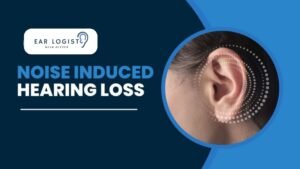Hearing loss due to cold means your hearing is affected by a cold, either because of the cold weather or a common cold infection. When you have a cold, your nose gets blocked, and that can also affect your ears. The middle ear, which is important for hearing, is connected to your nose through a small tube called the Eustachian tube. When this tube gets blocked because of mucus or swelling during a cold, it can cause temporary hearing loss.
How Does a Cold Cause Hearing Loss?
To understand how a cold affects your hearing, you need to know how the ear works. The ear has three parts: the outer ear, the middle ear, and the inner ear. Cold-related hearing loss usually affects the middle ear, and here’s how:
- Blocked Eustachian Tube
During a cold, the Eustachian tube, which connects the middle ear to the throat, can get clogged with mucus. This stops sound from traveling properly through the ear, making everything sound muffled. - Fluid Build-Up in the Ears
Colds can cause fluid to collect in the middle ear, which makes it harder for the eardrum to vibrate and transmit sound to the inner ear. This fluid buildup is common, especially in children. - Swelling and Inflammation
The cold virus can cause swelling not only in your nose but also in your ear tissues. When this happens, it can make it difficult to hear clearly.
Types of Hearing Loss from a Cold
Hearing loss caused by a cold usually falls into two main categories, though there can also be a mix of both:
- Conductive Hearing Loss
This type of hearing loss happens when sound can’t pass properly from the outer or middle ear to the inner ear. It’s the most common type of hearing loss during a cold. It usually goes away once the cold clears up. - Sensorineural Hearing Loss
This type of hearing loss affects the inner ear or the nerves responsible for hearing. It’s less common and can happen if a cold leads to a severe ear infection. This kind of hearing loss might not go away without medical help.
Symptoms of Hearing Loss Due to Cold
Hearing loss due to a cold often comes with some noticeable signs. While the condition is usually temporary, knowing what to look for can help you seek treatment faster. The most common symptoms include:
- Muffled Sounds
One of the first things you’ll notice is that sounds may seem quieter or muffled. It can feel like you have earplugs in your ears. - Fullness in the Ear
You may feel like your ears are full or blocked. This happens because of the pressure changes caused by the blockage in the Eustachian tube. - Ear Pain
Some people experience mild to severe ear pain, especially when they swallow or yawn. This pain is due to the pressure inside the ear. - Ringing in the Ears (Tinnitus)
You might hear a ringing or buzzing sound in your ears, known as tinnitus. This can happen if your ears are blocked during a cold. - Dizziness
Your ears help with balance, so if your ears are affected by a cold, you may feel dizzy or off-balance.
How Long Does Hearing Loss Due to Cold Last?
In most cases, hearing loss caused by a cold is temporary and should go away once your cold symptoms improve. For some people, hearing returns to normal in a few days, while for others, it may take a week or two. However, if your hearing loss lasts for more than two weeks, or if it gets worse, it’s a good idea to see a doctor.
When Should You See a Doctor?
Hearing loss during a cold usually isn’t something to worry about. However, there are some situations where you should see a doctor:
- If your hearing doesn’t return to normal after two weeks.
- If you have severe ear pain or notice any fluid draining from your ear.
- If your hearing loss is getting worse instead of better.
- If you’re experiencing dizziness or problems with balance that don’t go away.
Treatment for Hearing Loss Due to Cold
If your hearing is affected by a cold, there are several ways to manage the symptoms. Most of the time, treating the cold itself will also help with the hearing loss. Some treatments include:
- Decongestants
Over-the-counter decongestants can help clear up nasal congestion, which may help reduce the blockage in the Eustachian tube. - Nasal Sprays
Nasal sprays can help reduce swelling in the nasal passages, which may relieve pressure in the ears. - Ear Drops
In some cases, ear drops can help clear up any fluid buildup in the ear, improving your hearing. - Warm Compress
Applying a warm compress to the ear can help relieve ear pain and pressure. - Antibiotics
If your hearing loss is due to an ear infection, your doctor may prescribe antibiotics to clear up the infection.
How to Prevent Hearing Loss Due to Cold
While you can’t always prevent a cold, there are things you can do to reduce your chances of hearing loss when you catch one:
- Stay Hydrated
Drinking plenty of water can help keep mucus thin, making it easier for your body to clear it out. - Use a Humidifier
Keeping the air in your home moist can help prevent your nasal passages from becoming too dry, which can make cold symptoms worse. - Don’t Blow Your Nose Too Hard
Blowing your nose too hard can push mucus into your ears, making the blockage worse. Blow your nose gently to prevent this. - Wash Your Hands
Washing your hands regularly can help prevent colds, reducing the chances of developing cold-related hearing problems.
Can Hearing Loss Due to Cold Become Permanent?
For most people, hearing loss from a cold is temporary and will go away once the cold clears up. However, if the cold causes an ear infection or damages the eardrum, there is a small chance that the hearing loss could become more long-term. If you’re concerned about your hearing, it’s always a good idea to talk to a healthcare professional, especially if the problem doesn’t improve after a couple of weeks.
Conclusion
Hearing loss due to a cold is a common issue that can cause discomfort and frustration. While it’s usually temporary, it’s important to recognize the symptoms and take action if needed. Simple treatments like decongestants, nasal sprays, and warm compresses can help relieve the problem. In most cases, hearing returns to normal as the cold clears up. However, if your hearing loss persists or worsens, don’t hesitate to seek medical advice. By taking preventive steps and staying aware of your symptoms, you can reduce the impact of cold-related hearing loss and protect your ear health.
Also Read
- What is Fluctuating Hearing Loss?Fluctuating hearing loss means that a person’s hearing ability changes over time. One day, they might hear just fine, and the next day, sounds may seem muffled or distant. These changes can be temporary or happen repeatedly over time. Some
- What Is Hearing Loss Due to Cold?Hearing loss due to cold means your hearing is affected by a cold, either because of the cold weather or a common cold infection. When you have a cold, your nose gets blocked, and that can also affect your ears.
- Cochlear vs Retrocochlear Hearing LossHearing loss affects millions of people worldwide, but it doesn’t always occur for the same reasons or in the same part of the ear. Two common types of hearing loss are cochlear hearing loss and retrocochlear hearing loss. While both
- How to Calculate Hearing Loss PercentageHearing loss can be a complex condition that affects individuals differently. Some people may experience slight difficulty in hearing, while others might suffer from significant impairment. Understanding how to calculate hearing loss percentage is essential, especially for healthcare professionals, insurance
- Noise-Induced Hearing LossNoise-induced hearing loss (NIHL) is a type of hearing loss caused by exposure to loud noises. It happens when the sensitive structures in the inner ear, particularly tiny hair cells, get damaged. These cells are responsible for helping us hear,
Frequently Asked Question
Can a cold cause temporary hearing loss?
Yes, a cold can cause temporary hearing loss. The Eustachian tube, which connects your throat and middle ear, can get blocked due to mucus buildup. This leads to fluid accumulation in the ear, which makes sounds feel muffled. Once the cold is gone and the blockage clears, hearing usually returns to normal.
How does a blocked nose affect hearing?
A blocked nose can affect hearing because the Eustachian tube becomes clogged with mucus, causing pressure changes in the middle ear. This results in muffled hearing or temporary hearing loss. Once the nasal congestion clears, the hearing usually improves.
How long does hearing loss from a cold last?
Hearing loss from a cold usually lasts a few days to two weeks. It depends on how quickly the congestion in your nose and ears clears up. If the hearing loss lasts more than two weeks, you should see a doctor for further evaluation.
Will my hearing return to normal after a cold?
In most cases, yes. Once the cold symptoms subside and the Eustachian tube is no longer blocked, your hearing should return to normal. However, if you have an ear infection or other complications, it may take longer, or you might need medical treatment.
What are the symptoms of cold-related hearing loss?
Cold-related hearing loss symptoms include muffled sounds, a feeling of fullness in the ear, mild ear pain, and sometimes ringing (tinnitus). Some people also experience slight dizziness. These symptoms are usually temporary and go away as the cold improves.
Can an ear infection from a cold cause hearing loss?
Yes, a cold can sometimes lead to an ear infection, which may cause hearing loss. The infection causes fluid buildup and inflammation in the middle ear, leading to blocked sound transmission. Treating the infection with antibiotics can help restore hearing.
How can I treat hearing loss from a cold?
You can treat cold-related hearing loss with over-the-counter decongestants, nasal sprays, and warm compresses. These remedies help relieve ear pressure and congestion. If an ear infection is present, a doctor may prescribe antibiotics to clear it up.
Is it normal to feel ear pain during a cold?
Yes, ear pain during a cold is common. The pressure caused by nasal congestion and blocked Eustachian tubes can lead to discomfort in the ears. The pain should ease as the congestion clears up. If the pain is severe or persistent, seek medical advice.
Should I see a doctor for hearing loss during a cold?
You don’t usually need to see a doctor for cold-related hearing loss unless the problem lasts for more than two weeks, gets worse, or is accompanied by severe pain or fluid drainage from the ear. If these symptoms occur, consult a healthcare professional.
How can I prevent hearing loss when I have a cold?
To prevent hearing loss during a cold, keep your nasal passages clear by using decongestants or nasal sprays. Drink plenty of water and use a humidifier to reduce nasal congestion. Avoid blowing your nose too hard, as it can push mucus into your ears.








